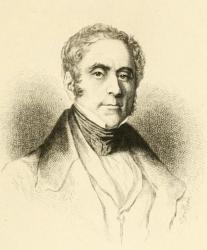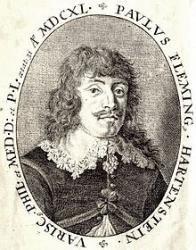
1584 - 1640 Person Name: Joh. Altenburg Hymnal Number: 669 Author of "Forfærdes ei, du lille Hob" in Salmebog for Lutherske Kristne i Amerika Altenburg, Johann Michael, b. at Alach, near Erfurt, on Trinity Sunday, 1584. After completing his studies he was for some time teacher and precentor in Erfurt. In 1608 he was appointed pastor of Ilversgehofen and Marbach near Erfurt; in 1611, of Troch-telborn; and in 1621 of Gross-Sommern or Som-merda near Erfurt. In the troublous war times he was forced, in 1631, to flee to Erfurt, and there, on the news of the victory of Leipzig, Sept. 17, 1631, he composed his best known hymn. He remained in Erfurt without a charge till, in 1637, he was appointed diaconus of the Augustino Church, and, in 1638, pastor of St. Andrew's Church. He d. at Erfurt February 12, 1640 (Koch, iii. 115-117 ; Allg. Deutsche Biog., i. p. 363, and x. p. 766—the latter saying he did not go to Erfurt till 1637). He was a good musician, and seems to have been the composer of the melodies rather than of the words of some of the hymns ascribed to him. Two of his hymns have been tr. into English, viz. :—1. Aus Jakob's Staxnm ein Stern sehr klar. [Christmas.] Included as No. 3 of his Christ-liche liebliche und anddchtige newe Kirchen- und Hauss-Gestinge, pt. i., Erfurt, 1G20, in 3 st. of 5 1. According to Wetzel's A. H., vol. i., pt. v. p. 41, it was first pub. in J. Forster's Jlohen Festtags-Schreinlein, 1611. In the Unv. L. S., 1851, No. 24. It has been tr. as " From Jacob's root, a star so clear," by Miss Manington, 1864, p. 13.2. Verzage nicht du Hauflein klein. [In Trouble.] Concerning the authorship of this hymn there are three main theories—i. that it is by Gustavus Adolphus; ii. that the ideas are his and the diction that of his chaplain, Dr. Jacob Fabricius; and iii. that it is by Altenburg. In tracing out the hymn we find that:—The oldest accessible form is in two pamphlets published shortly after the death of Gustavus Adolphus, viz., the Epicedion, Leipzig, n.d. but probably in the end of 1632 [Royal Library, Berlin]: and Arnold Mengering's Blutige Siegs-Crone, Leipzig, 1633 [Town Library, Hamburg]. In the Epicedion the hymn is entitled, " Konig-licher Schwanengesang So ihre Majest. vor dem Ltltzen-schen Treffen inniglichen zu Gott gesungen "; and in the Siegs-Crone, p. 13, "Der S. Kon. Mayt. zu Schweden Lied, welches Sie vor der Schlacht gesungen." In both cases there are 3 sts. :—i. Verzage nicht, du Hiiuffiein klein. ii. Triistedich dess, dass deine Sach. iii. So wahr Gott Gott ist, und sein Wort.The next form is that in J. Clauder's Psalmodiae Novae Pars Tertia, Leipzig, 1636, No. 17, in 5 st. of 6 lines, st. i.-iii. as above, and—iv. Ach Gott gieb in des deine Gnad v. Hilff dass wir auch nach deinem Wort. No author's name is given. In the Bayreuth G. B., 1668, p. 266, st. iv., v., are marked as an addition by Dr. Samuel Zehner; and by J. C. Olearius in his Lieder-Schatz, 1705, p. 141, as written in 1638 (1633 ?), when the Croats had partially burnt Schleusiugen, where Zehner was then superintendent.The third form of importance is that given in Jcremias Weber's Leipzig G. B., 1638, p. 651, where it is entitled " A soul-rejoicing hymn of Consolation upon the watchword—God with us—used by the Evangelical army in the battle of Leipzig, 7th Sept., 1631, composed by M. Johann Altenburg, pastor at Gross Soinmern in Dtiringen," [i.e. Sommerda in Thuringia]. It is in 5 sts., of which sts. i.-iii. are the same as the 1633, and are marked as by Altenburg. St. iv., v., beginning— iv. Drilmb sey getrost du kleines Heer v. Amen, das hilff Ilerr Jesu Christ, are marked as " Additamentum Ignoti." This is the form in C. U. as in the Berlin G. L. S., ed. 1863, No. 1242.In favour of Altenburg there is the explicit declaration of the Leipzig G. B., 1638, followed by most subsequent writers. The idea that the hymn was by Gustavus Adolphus seems to have no other foundation than that in many of the old hymn-books it was called Gustavus Adolphus's Battle Hymn. The theory that the ideas were communicated by the King to his chaplain, Dr. Fabricius, after the battle of Leipzig, and by Fabricius versified, is maintained by Mohnike in his Hymnologische Forschungen, 1832, pt. ii. pp. 55-98, but rests on very slender evidence. In Koch, viii. 138-141, there is the following striking word-picture:—If, then, we must deny to the hymn Albert Knapp's characterisation of it as " a little feather from the eagle wing of Gustavus Adolphus," so much the more its original title as his "Swan Song" remains true. It was on the morning of the 6 Nov., 1632, that the Catholic army under Wallenstein and the Evangelical under Gustavus Adolphus stood over against each other at Lutzen ready to strike. As the morning dawned Gustavus Adolphus summoned his Court preacher Fabricius, and commanded him, as also the army chaplains of all the other regiments, to hold a service of prayer. During this service the whole host sung the pious king's battle hymn—" Verzage nicht, du Hauflein klein."He himself was on his knees and prayed fervently. Meantime a thick mist had descended, which hid the fatal field so that nothing could be distinguished. When the host had now been set in battle array he gave them as watchword for the fight the saying, "God with us," mounted his horse, drew his sword, and rode along the lines of the army to encourage the soldiers for the battle. First, however, he commanded the tunes Ein feste Burg and Es wollt tins Gott genadig sein to be played by the kettledrums and trumpets, and the soldiers joined as with one voice. The mist now began to disappear, and the sun shone through. Then, after a short prayer, he cried out: " Now will we set to, please God," and immediately after, very loud, " Jesu, Jesu, Jesu, help me today to fight for the honour of Thy Holy Name." Then he attacked the enemy at full speed, defended only by a leathern gorget. " God is my harness," he had said to the servant who wished to put on his armour. The conflict was hot and bloody. About 11 o'clock in the forenoon the fatal bullet struck him, and he sank, dying, from his horse, with the words, “My God, my God!" Till twilight came on the fight raged, and was doubtful. But at length the Evangelical host obtained the victory, as it had prophetically sung at dawn."This hymn has ever been a favourite in Germany, was sung in the house of P. J. Spener every Sunday afternoon, and of late years has been greatly used at meetings of the Gustavus Adolphus Union—an association for the help of Protestant Churches in Roman Catholic countries. In translations it has passed into many English and American collections.
Translations in C. U.:—
Fear not, 0 little flock, the foe. A good tr. from the text of 1638, omitting st. iv., by Miss Winkworth, in her Lyra Ger., 1855, p. 17. Included, in England in Kennedy, 1863, Snepp's S. of G. and G., 1871, Free Church H. Bk., 1882, and others; and in America in the Sabbath H. Book., 1858, Pennsylvania Luth. Ch. Bk., 1868, Hys. of the Church, 1869, Bapt. H. Bk., 1871, H. and Songs of Praise, 1874, and many others.
Be not dismay'd, thou little flock. A good tr. of st. i.-iii. of the 1638 text in Mrs. Charles's V. of Christian Life in Song, 1858, p. 248. She tr. from the Swedish, which, in the Swensha Psalm Boken, Carlstadt, N.D. (1866), is given as No. 378, "Forfaras ej, du lilla hop !" and marked Gustaf II. Adolf. Her version is No. 204 in Wilson's Service of Praise, 1865.
Thou little flock, be not afraid. A tr. of st. i.-iii. from the 1638 text, by M. Loy, in the Ohio Luth. Hymnal, 1880, No. 197.
Other trs. are all from the text of 1638.(1.) " Be not dishearten'd, little flock," by Dr. II. Mills, 1856, p. 121. (2.) " Despond not, little band, although," by Dr. G. Walker, 1860, p. 41. (3.) "Be not dismay'd, thou little flock, Nor," by E. Massie, 1866, p. 143. (4.) " 0 little flock, be not afraid," in J. D. Burns's Memoir and Remains, 1869. p. 226.
–John Julian, Dictionary of Hymnology (1907)
Michael Altenburg


 My Starred Hymns
My Starred Hymns




